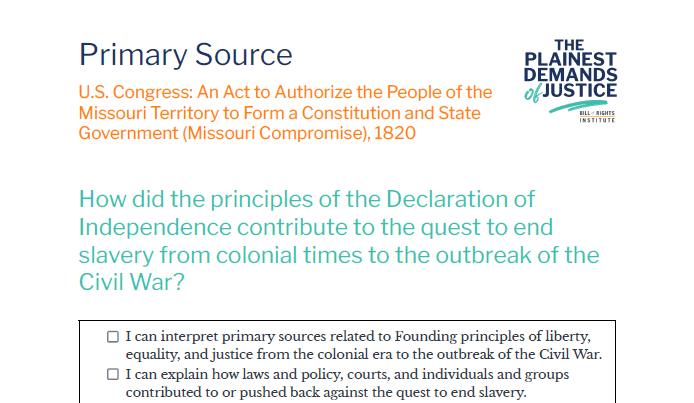U.S. Congress: An Act to Authorize the People of the Missouri Territory to Form a Constitution and State Government (Missouri Compromise), 1820
How did the principles of the Declaration of Independence contribute to the quest to end slavery from colonial times to the outbreak of the Civil War?
- I can interpret primary sources related to Founding principles of liberty, equality, and justice from the colonial era to the outbreak of the Civil War.
- I can explain how laws and policy, courts, and individuals and groups contributed to or pushed back against the quest to end slavery.
- I can create an argument using evidence from primary sources.
- I can analyze issues in history to help find solutions to present-day challenges.
Building Context
The Northwest Ordinance of 1787 set a precedent that slavery would be banned from future states added to the Union north of the Ohio River. The Southwest Ordinance of 1790, however, allowed slavery in future states south of the Ohio River. As more states petitioned to join the union in the nineteenth century, the debate surrounding the expansion of slavery intensified. Several attempts at a compromise were introduced, including the Missouri Compromise below. The 16th United States Congress passed the legislation on March 3, 1820, and President James Monroe signed it on March 6, 1820. The compromise admitted Maine as a free state and Missouri as a slave state, and it established a boundary in the Louisiana Territory dividing territories into slave and free to avoid future conflict.
Missouri Compromise (1820)
Source: https://www.ourdocuments.gov/doc.php?flash=false&doc=22&page=transcript
SEC. 8 . . .That in all that territory ceded by France to the United States, under the name of Louisiana, which lies north of thirty-six degrees and thirty minutes north latitude, not included within the limits of the state, contemplated by this act, slavery and involuntary servitude, otherwise than in the punishment of crimes, whereof the parties shall have been duly convicted, shall be, and is hereby, forever prohibited.
Comprehension and Analysis Questions
- Summarize what this legislation says in your own words.
- Predict this legislation’s effect on sectionalism in the United States
- To what extent is the Missouri Compromise a continuation of or a change in federal policy on the expansion of slavery? Consider the Northwest and Southwest Ordinances referenced in the introduction in your response.
